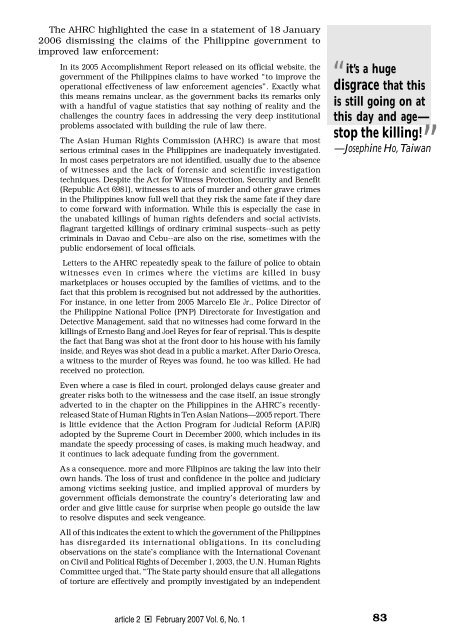of the Philippines the criminal justice system is - Article 2
of the Philippines the criminal justice system is - Article 2
of the Philippines the criminal justice system is - Article 2
You also want an ePaper? Increase the reach of your titles
YUMPU automatically turns print PDFs into web optimized ePapers that Google loves.
The AHRC highlighted <strong>the</strong> case in a statement <strong>of</strong> 18 January<br />
2006 d<strong>is</strong>m<strong>is</strong>sing <strong>the</strong> claims <strong>of</strong> <strong>the</strong> Philippine government to<br />
improved law enforcement:<br />
In its 2005 Accompl<strong>is</strong>hment Report released on its <strong>of</strong>ficial website, <strong>the</strong><br />
government <strong>of</strong> <strong>the</strong> <strong>Philippines</strong> claims to have worked “to improve <strong>the</strong><br />
operational effectiveness <strong>of</strong> law enforcement agencies”. Exactly what<br />
th<strong>is</strong> means remains unclear, as <strong>the</strong> government backs its remarks only<br />
with a handful <strong>of</strong> vague stat<strong>is</strong>tics that say nothing <strong>of</strong> reality and <strong>the</strong><br />
challenges <strong>the</strong> country faces in addressing <strong>the</strong> very deep institutional<br />
problems associated with building <strong>the</strong> rule <strong>of</strong> law <strong>the</strong>re.<br />
The Asian Human Rights Comm<strong>is</strong>sion (AHRC) <strong>is</strong> aware that most<br />
serious <strong>criminal</strong> cases in <strong>the</strong> <strong>Philippines</strong> are inadequately investigated.<br />
In most cases perpetrators are not identified, usually due to <strong>the</strong> absence<br />
<strong>of</strong> witnesses and <strong>the</strong> lack <strong>of</strong> forensic and scientific investigation<br />
techniques. Despite <strong>the</strong> Act for Witness Protection, Security and Benefit<br />
(Republic Act 6981), witnesses to acts <strong>of</strong> murder and o<strong>the</strong>r grave crimes<br />
in <strong>the</strong> <strong>Philippines</strong> know full well that <strong>the</strong>y r<strong>is</strong>k <strong>the</strong> same fate if <strong>the</strong>y dare<br />
to come forward with information. While th<strong>is</strong> <strong>is</strong> especially <strong>the</strong> case in<br />
<strong>the</strong> unabated killings <strong>of</strong> human rights defenders and social activ<strong>is</strong>ts,<br />
flagrant targetted killings <strong>of</strong> ordinary <strong>criminal</strong> suspects--such as petty<br />
<strong>criminal</strong>s in Davao and Cebu--are also on <strong>the</strong> r<strong>is</strong>e, sometimes with <strong>the</strong><br />
public endorsement <strong>of</strong> local <strong>of</strong>ficials.<br />
Letters to <strong>the</strong> AHRC repeatedly speak to <strong>the</strong> failure <strong>of</strong> police to obtain<br />
witnesses even in crimes where <strong>the</strong> victims are killed in busy<br />
marketplaces or houses occupied by <strong>the</strong> families <strong>of</strong> victims, and to <strong>the</strong><br />
fact that th<strong>is</strong> problem <strong>is</strong> recogn<strong>is</strong>ed but not addressed by <strong>the</strong> authorities.<br />
For instance, in one letter from 2005 Marcelo Ele Jr., Police Director <strong>of</strong><br />
<strong>the</strong> Philippine National Police (PNP) Directorate for Investigation and<br />
Detective Management, said that no witnesses had come forward in <strong>the</strong><br />
killings <strong>of</strong> Ernesto Bang and Joel Reyes for fear <strong>of</strong> repr<strong>is</strong>al. Th<strong>is</strong> <strong>is</strong> despite<br />
<strong>the</strong> fact that Bang was shot at <strong>the</strong> front door to h<strong>is</strong> house with h<strong>is</strong> family<br />
inside, and Reyes was shot dead in a public a market. After Dario Oresca,<br />
a witness to <strong>the</strong> murder <strong>of</strong> Reyes was found, he too was killed. He had<br />
received no protection.<br />
Even where a case <strong>is</strong> filed in court, prolonged delays cause greater and<br />
greater r<strong>is</strong>ks both to <strong>the</strong> witnessess and <strong>the</strong> case itself, an <strong>is</strong>sue strongly<br />
adverted to in <strong>the</strong> chapter on <strong>the</strong> <strong>Philippines</strong> in <strong>the</strong> AHRC’s recentlyreleased<br />
State <strong>of</strong> Human Rights in Ten Asian Nations—2005 report. There<br />
<strong>is</strong> little evidence that <strong>the</strong> Action Program for Judicial Reform (APJR)<br />
adopted by <strong>the</strong> Supreme Court in December 2000, which includes in its<br />
mandate <strong>the</strong> speedy processing <strong>of</strong> cases, <strong>is</strong> making much headway, and<br />
it continues to lack adequate funding from <strong>the</strong> government.<br />
As a consequence, more and more Filipinos are taking <strong>the</strong> law into <strong>the</strong>ir<br />
own hands. The loss <strong>of</strong> trust and confidence in <strong>the</strong> police and judiciary<br />
among victims seeking <strong>justice</strong>, and implied approval <strong>of</strong> murders by<br />
government <strong>of</strong>ficials demonstrate <strong>the</strong> country’s deteriorating law and<br />
order and give little cause for surpr<strong>is</strong>e when people go outside <strong>the</strong> law<br />
to resolve d<strong>is</strong>putes and seek vengeance.<br />
All <strong>of</strong> th<strong>is</strong> indicates <strong>the</strong> extent to which <strong>the</strong> government <strong>of</strong> <strong>the</strong> <strong>Philippines</strong><br />
has d<strong>is</strong>regarded its international obligations. In its concluding<br />
observations on <strong>the</strong> state’s compliance with <strong>the</strong> International Covenant<br />
on Civil and Political Rights <strong>of</strong> December 1, 2003, <strong>the</strong> U.N. Human Rights<br />
Committee urged that, “The State party should ensure that all allegations<br />
<strong>of</strong> torture are effectively and promptly investigated by an independent<br />
“<br />
it’s a huge<br />
d<strong>is</strong>grace that th<strong>is</strong><br />
<strong>is</strong> still going on at<br />
th<strong>is</strong> day and age—<br />
stop <strong>the</strong> killing!<br />
—Josephine Ho, Taiwan”<br />
article 2 • February 2007 Vol. 6, No. 1 83

















